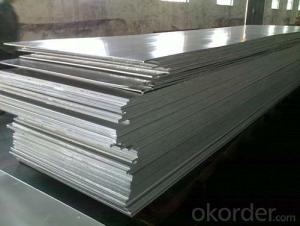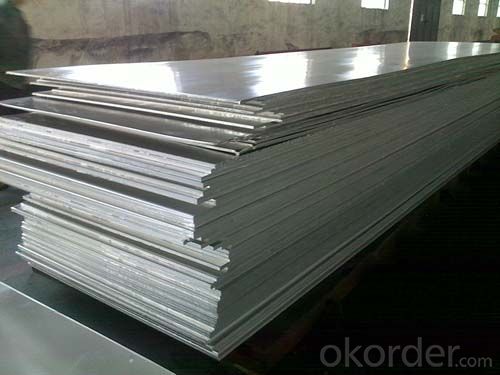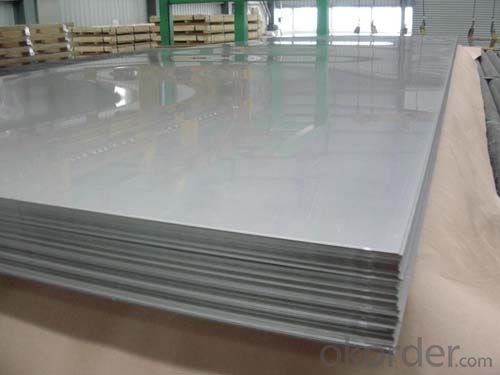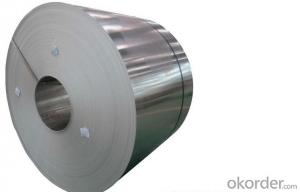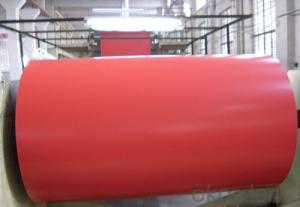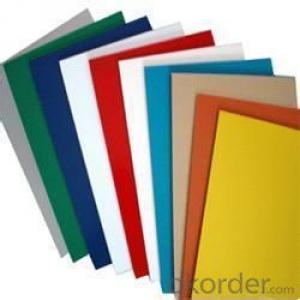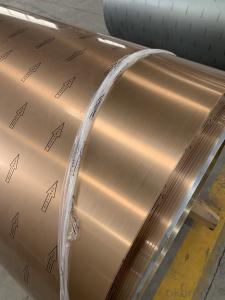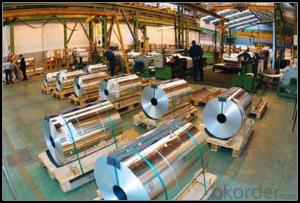Aluminum Coil Anodizing Company - Thick Aluminium Anodized Sheet for Different Usages
- Loading Port:
- China main port
- Payment Terms:
- TT OR LC
- Min Order Qty:
- 5 m.t.
- Supply Capability:
- 5000 m.t./month
OKorder Service Pledge
OKorder Financial Service
You Might Also Like
Specification
1. Description of Thick Aluminium Anodized Sheet for Different Usages
| Alloy No. | Thickness (mm) | Width (mm) | Length (mm) | Temper | |
| A1050,A1060, A1070,A1100 | 0.2-100 | 20-2200 | 20-8000 | O,H12,H22,H14,H16,H18, H24,H26,etc | |
| A3003,A3105,A3004 | 0.2-100 | 20-2200 | 20-8000 | O,H14,H18,H24,etc | |
| A5052 ,A5005,A5083,A5754 | 0.2-100 | 20-2200 | 20-8000 | O,H18,H24,H32,H34,H111,H112 ,etc | |
| A6061,A6082,A6063 | 0.2-200 | 20-2200 | 20-8000 | T4,T6, T651,etc | |
| A8011 | 0.2-100 | 20-2200 | 20-8000 | O,H12,H22,H14,H16,H18,H24,H26, etc | |
| Packing : Export wooden pallets. The bundle wegiht not exceed 2MT. Loading:by 1x20GP, 1X20GP can load about 18MT | |||||
| Standards:ASTM-B209. EN573-1, GB/T3880.1-2006 | |||||
| Quality of material: totally free from defects like white rust, oil patches, roll marks, edge damage, camber, dents, holes, break lines, scratches and free from coil set | |||||
2. Application of Thick Aluminium Anodized Sheet for Different Usages
Mainly used insigns, billboards, building exterior decoration, bus body, high-rise buildings and factories wall decoration, kitchen sink, lamp, fan leaves, with pieces of electronic, chemical equipment, sheet metal processing parts, deep drawing or spinning hollowware, welding parts, heat exchangers, bell surface and disk, plate, kitchenware, decorations, reflective devices, ect
3. Feature of Thick Aluminium Anodized Sheet for Different Usages
1.High temperature resistant
2.Weathering resistant
3.Scrubbing resistant
4.Sound insulation
5.Acid or alkali proof
6. Fireproof
7.Light weight material is easy to construct and install
4. Certificate:
SGS and ROHS(if client request, paid by client), MTC(plant provided), Certificate of Origin(FORM A, FORM E, CO), Bureau Veritas and SGS (if client request, paid by client), CIQS certificate
5. Image of Thick Aluminium Anodized Sheet for Different Usages
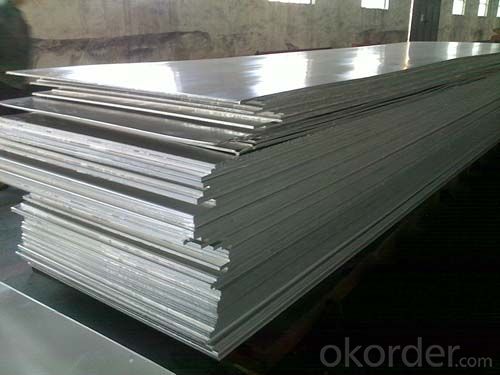
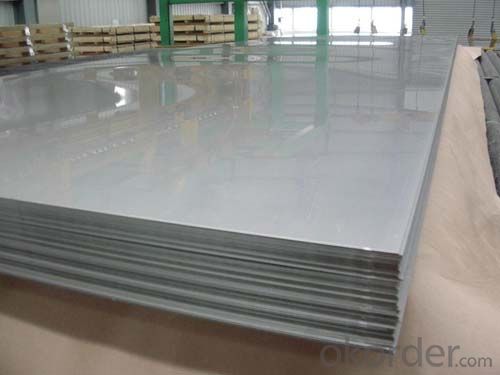
5. FAQ
1) What is the delivery time?
Dpends on actual order, around 20 days
2) What is the QC system:
We have QC staff of 20 persons and advanced equipment, each production is with MTC traced from Aluminum ingot lot.
3) What market do you mainly sell to?
Australia, America, Asia, Middle East, Western Europe, Africa etc
- Q: Are aluminum coils suitable for HVAC systems?
- Indeed, HVAC systems can utilize aluminum coils as they prove to be a suitable choice. When compared to conventional copper coils, aluminum coils present numerous advantages. Notably, their heightened resistance to corrosion aids in prolonging the lifespan of the HVAC system. Moreover, aluminum coils possess superior heat transfer properties, facilitating more efficient cooling and heating processes. Additionally, their lighter weight allows for effortless installation and manageable handling during maintenance or repairs. Consequently, aluminum coils emerge as a dependable and cost-effective alternative for HVAC systems.
- Q: What is the shear strength of aluminum coils?
- The shear strength of aluminum coils can vary depending on various factors such as the alloy composition, temper, thickness, and processing conditions. Generally, aluminum alloys have lower shear strength compared to other materials like steel or titanium. However, aluminum coils are commonly used in applications where shear strength is not the primary concern, but rather their lightweight, corrosion resistance, and malleability properties. To get a more precise answer, it is necessary to specify the exact alloy, temper, and dimensions of the aluminum coil in question. These factors will significantly affect the shear strength of the material. It is also worth noting that shear strength can be influenced by factors like the presence of impurities, heat treatment, and the manufacturing process used. In conclusion, the shear strength of aluminum coils can vary depending on various factors, and it is essential to consider the specific alloy, temper, and dimensions to determine the exact strength of the material in a given application.
- Q: How are aluminum coils protected against dust and dirt during storage?
- Aluminum coils are protected against dust and dirt during storage through various measures to ensure their quality and prevent any potential damage. One common method is to wrap the coils securely with a protective covering, such as plastic or polyethylene sheets, to create a barrier against dust and dirt particles. This covering is usually tightly sealed to prevent any contaminants from entering. In addition to the wrapping, other precautions are taken to minimize the risk of dust and dirt accumulation. Storage areas are often kept clean and free from debris to reduce the likelihood of contaminants settling on the coils. Regular cleaning and maintenance of the storage space are necessary to maintain a dust-free environment. Moreover, proper ventilation and air filtration systems are employed in storage facilities to control airborne particles and maintain a clean atmosphere. These systems help to reduce the amount of dust and dirt that can settle on the coils. It is also crucial to handle the aluminum coils with care during transportation and storage to avoid unnecessary exposure to dust and dirt. Employing proper handling equipment and techniques, such as using clean gloves and avoiding dragging the coils on the ground, can prevent the accumulation of contaminants. By implementing these protective measures, aluminum coils can be stored safely and securely, ensuring their quality remains intact and preventing any potential issues caused by dust and dirt accumulation.
- Q: What is the typical price gap between purchasing new aluminum coils versus used ones?
- <p>The price difference between new and used aluminum coils can vary significantly based on factors such as the quality of the used coils, market demand, and the specific grade of aluminum. On average, used aluminum coils can be 20-50% cheaper than new ones. However, this is a broad estimate and actual prices can fluctuate. It's essential to check current market prices and consider the condition of the used coils before making a purchase decision.</p>
- Q: Why the end of the aluminum coil will have a yellow spot?
- The reason may be that the manufacturer is not cleaned, and must be carefully cleaned before coating, or there may be paint fall off phenomenon.
- Q: i've been looking all over the internet for this information and i cant fin it! please help!what is aluminum's isotopic notation?what is aluminum's density at room temperature with units?what is aluminum's most common oxidation # ?aluminums e-dot diagram? symbol with valence electronschemical equation?enviornmental concers?
- isotopic okorder type environmental hazards of aluminum in the search bar and press search
- Q: What are the common joining techniques used for aluminum coils?
- Aluminum coils can be joined using various techniques, including welding, adhesive bonding, mechanical fastening, and soldering. When it comes to joining aluminum coils, welding is a widely used technique. Different welding methods, such as gas tungsten arc welding (GTAW or TIG), gas metal arc welding (GMAW or MIG), and laser welding, can be employed. These methods fuse the aluminum coils together, providing a strong and durable joint that ensures structural integrity. Another technique for joining aluminum coils is adhesive bonding. This method involves applying a suitable adhesive or bonding agent to join the coils. Adhesive bonding offers excellent flexibility, allowing for the joining of dissimilar materials and creating a smooth, aesthetically pleasing surface. It also distributes stress evenly across the joint, reducing the risk of fatigue failure. Mechanical fastening is another option for joining aluminum coils. This technique utilizes mechanical elements like bolts, screws, rivets, or clips. It is a relatively simple and cost-effective method, allowing for easy disassembly if needed. Mechanical fasteners provide good strength and stability, although periodic maintenance may be required to prevent loosening over time. Soldering is a low-temperature alloy-based technique for joining aluminum coils. It involves heating the solder to its melting point and allowing it to flow into the joint, creating a strong bond. Soldering is commonly used for electrical connections or delicate applications where excessive heat can damage the aluminum. However, it may not offer the same level of strength as welding or mechanical fastening. The choice of joining technique for aluminum coils depends on various factors, including specific application requirements, desired strength, appearance, and cost considerations.
- Q: Is it safe or effective to use a hot plate for heating an aluminum coil?
- <p>Yes, you can use a hot plate to heat an aluminum coil, but with caution. Aluminum is a good conductor of heat, so it will heat up quickly. Ensure that the coil is clean and free from any residues that might cause uneven heating or damage. Monitor the temperature closely to prevent overheating, as aluminum can warp or melt at high temperatures. Use a heat-resistant surface or a heat diffuser to distribute the heat evenly and protect the hot plate surface. Always follow safety guidelines and manufacturer recommendations for both the hot plate and the aluminum coil.</p>
- Q: I go on a trip once a year with a group of lets say 10 people, we go for 7 nights and consume on average approx 120 cans of beer each (throughout the week). We have a fire burning the whole time in a hole that we dig approx 1ft deep, then we dispose of each can in the fire and let them melt down never thinking about them again. That's approx 1,200 cans that melt in the one fire hole.Will the aluminum have an affect on the soil? does anyone know what sort of damage this can cause? and for what distance / area around the fire might be affected?The theory amongst the group is that cans do not hurt anything so that's why they take cans instead of glass.Thanks
- Aluminum is very reactive in air and will form a layer of aluminum oxide around the outside of any piece. This oxide layer is very stable which is why aluminum doesn't corrode. Since your block of aluminum will be totally oxidized being in a fire, it's inert and just going to sit in the hole for the foreseeable future. The burning paint might not be healthy to breath but that's about the only hazard. Most common soil is a mixture of aluminum, carbon and silica compounds anyways so you aren't even adding anything particularly exotic. Alternatively, you could bring along a couple fifths of whiskey. It's lighter and has less packaging so it's the environmentally friendly way to get drunk.
- Q: Are aluminum coils suitable for electrical conductivity applications?
- Yes, aluminum coils are suitable for electrical conductivity applications. Aluminum is known for its excellent electrical conductivity, second only to copper among common metals. It has approximately 61% of the conductivity of copper, making it a reliable choice for various electrical applications. Aluminum coils are commonly used in power transmission, transformers, and electrical motors due to their ability to efficiently conduct electricity. Additionally, aluminum coils are lightweight, which makes them easier to handle and install in electrical systems. However, it is important to note that aluminum has a higher resistance compared to copper, so larger aluminum conductors may be required to achieve the same electrical performance. Overall, aluminum coils are a suitable option for electrical conductivity applications.
Send your message to us
Aluminum Coil Anodizing Company - Thick Aluminium Anodized Sheet for Different Usages
- Loading Port:
- China main port
- Payment Terms:
- TT OR LC
- Min Order Qty:
- 5 m.t.
- Supply Capability:
- 5000 m.t./month
OKorder Service Pledge
OKorder Financial Service
Similar products
Hot products
Hot Searches
Related keywords
